
1
A woman should soften but not weaken a man.Sigmund Freud

2
Whoever loves becomes humble. Those who love have , so to speak , pawned a part of their narcissism.Sigmund Freud
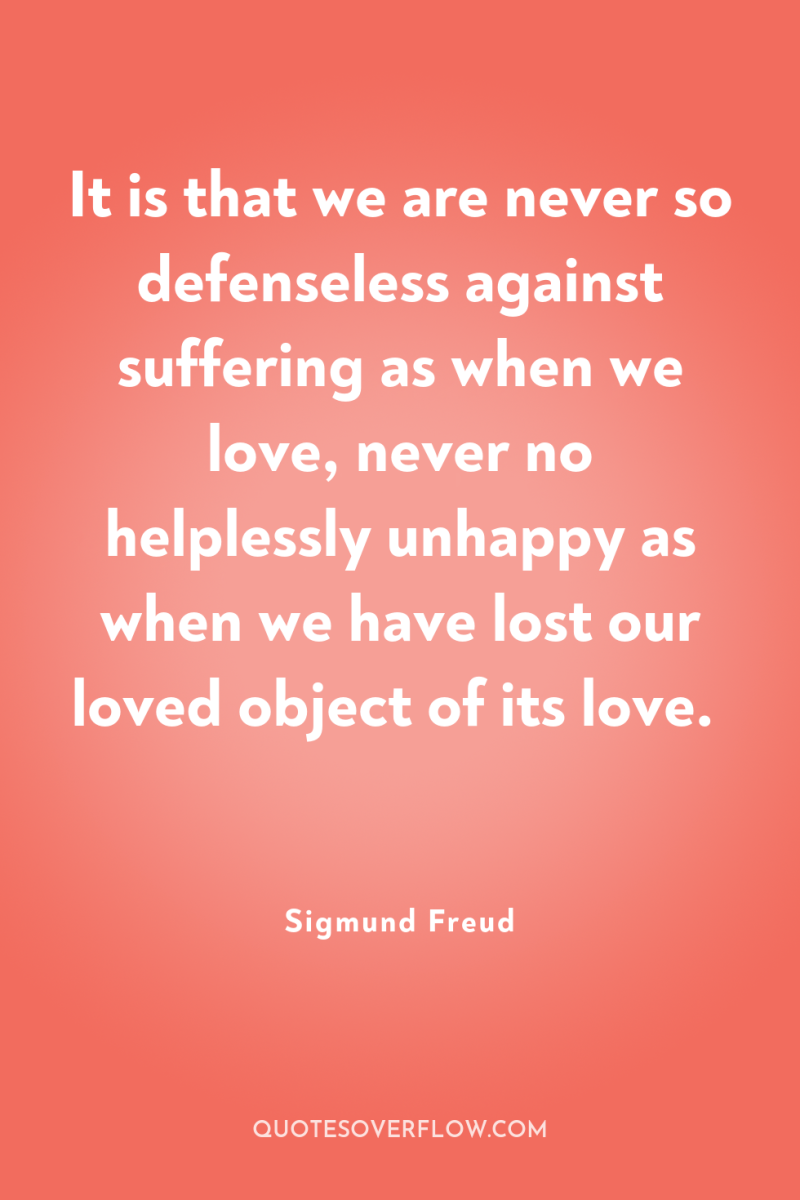
3
It is that we are never so defenseless against suffering as when we love, never no helplessly unhappy as when we have lost our loved object of its love.Sigmund Freud
4
Human beings are funny. They long to be with the person they love but refuse to admit openly. Some are afraid to show even the slightest sign of affection because of fear. Fear that their feelings may not be recognized, or even worst, returned. But one thing about human beings puzzles me the most is their conscious effort to be connected with the object of their affection even if it kills them slowly within.Sigmund Freud
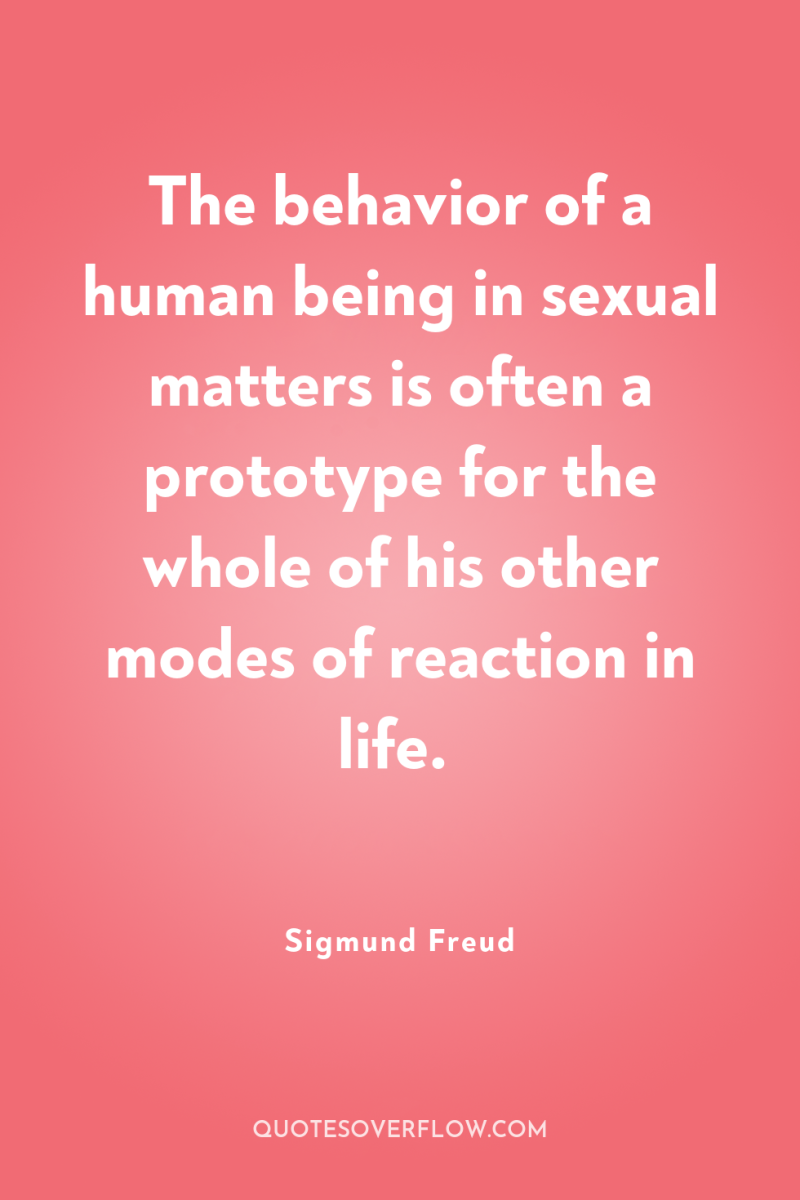
5
The behavior of a human being in sexual matters is often a prototype for the whole of his other modes of reaction in life.Sigmund Freud
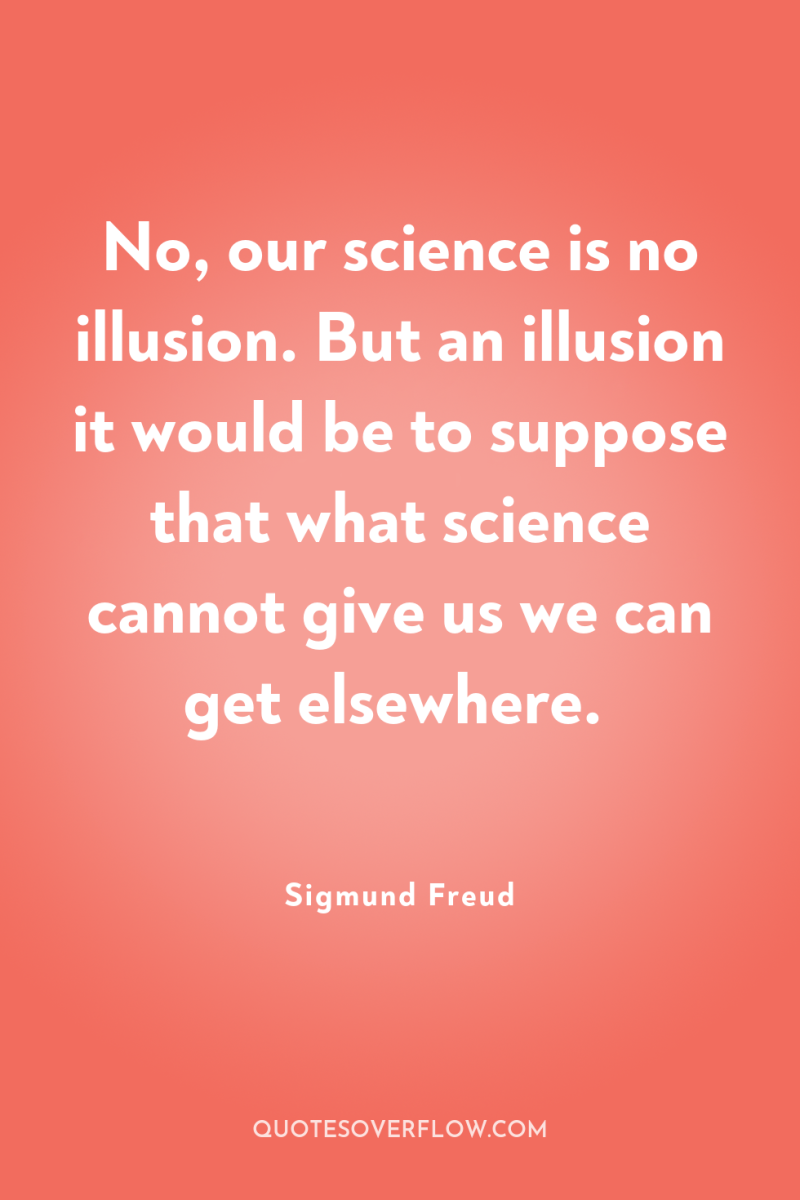
6
No, our science is no illusion. But an illusion it would be to suppose that what science cannot give us we can get elsewhere.Sigmund Freud

7
My love is something valuable to me which I ought not to throw away without reflection.Sigmund Freud
8
...our philosophy has preserved essential traits of animistic modes of thought such as the over-estimation of the magic of words and the belief that real processes in the external world follow the lines laid down by our thoughts.Sigmund Freud
9
Religious doctrines … are all illusions, they do not admit of proof, and no one can be compelled to consider them as true or to believe in them.Sigmund Freud

10
One day, in retrospect, the years of struggle will strike you as the most beautiful.Sigmund Freud

11
The intention that man should be happy is not in the plan of Creation.Sigmund Freud
12
No other technique for the conduct of life attaches the individual so firmly to reality as laying emphasis on work; for his work at least gives him a secure place in a portion of reality, in the human community. The possibility it offers of displacing a large amount of libidinal components, whether narcissistic, aggressive or even erotic, on to professional work and on to the human relations connected with it lends it a value by no means second to what it enjoys as something indispensible to the preservation and justification of existence in society. Professional activity is a source of special satisfaction if it is a freely chosen one – if, that is to say, by means of sublimation, it makes possible the use of existing inclinations, of persisting or constitutionally reinforced instinctual impulses. And yet, as a path to happiness, work is not highly prized by men. They do not strive after it as they do after other possibilities of satisfaction. The great majority of people only work under the stress of necessity, and this natural human aversion to work raises most difficult social problems.Sigmund Freud
13
The question of the purpose of human life has been raised countless times; it has never yet received a satisfactory answer and perhaps does not admit of one. Some of those who have asked it have added that if it should turn out that life has no purpose, it would lose all value for them. But this threat alters nothing. It looks, on the contrary, as though one had a right to dismiss the question, for it seems to derive from the human presumptuousness, many other manifestations of which are already familiar to us. Nobody talks about the purpose of the life of animals, unless, perhaps, it may be supposed to lie in being of service to man. But this view is not tenable either, for there are many animals of which man can make nothing, except to describe, classify and study them; and innumerable species of animals have escaped even this use, since they existed and became extinct before man set eyes on them.Sigmund Freud
14
We will therefore turn to the less ambitious question of what men themselves show by their behavior to be the purpose and intention of their lives. What do they demand of life and wish to achieve in it? The answer to this can hardly be in doubt. They strive for happiness; they want to become happy and to remain so. This endeavor has two sides, a positive and a negative aim. It aims, on the one hand, at an absence of pain and unpleasure, and, on the other, at the experiencing of strong feelings of pleasure. In its narrower sense the word 'happiness' only relates to the last. In conformity with this dichotomy in his aims, man's activity develops in two directions, according as it seeks to realize – in the main, or even exclusively – the one or the other of these aims. .Sigmund Freud
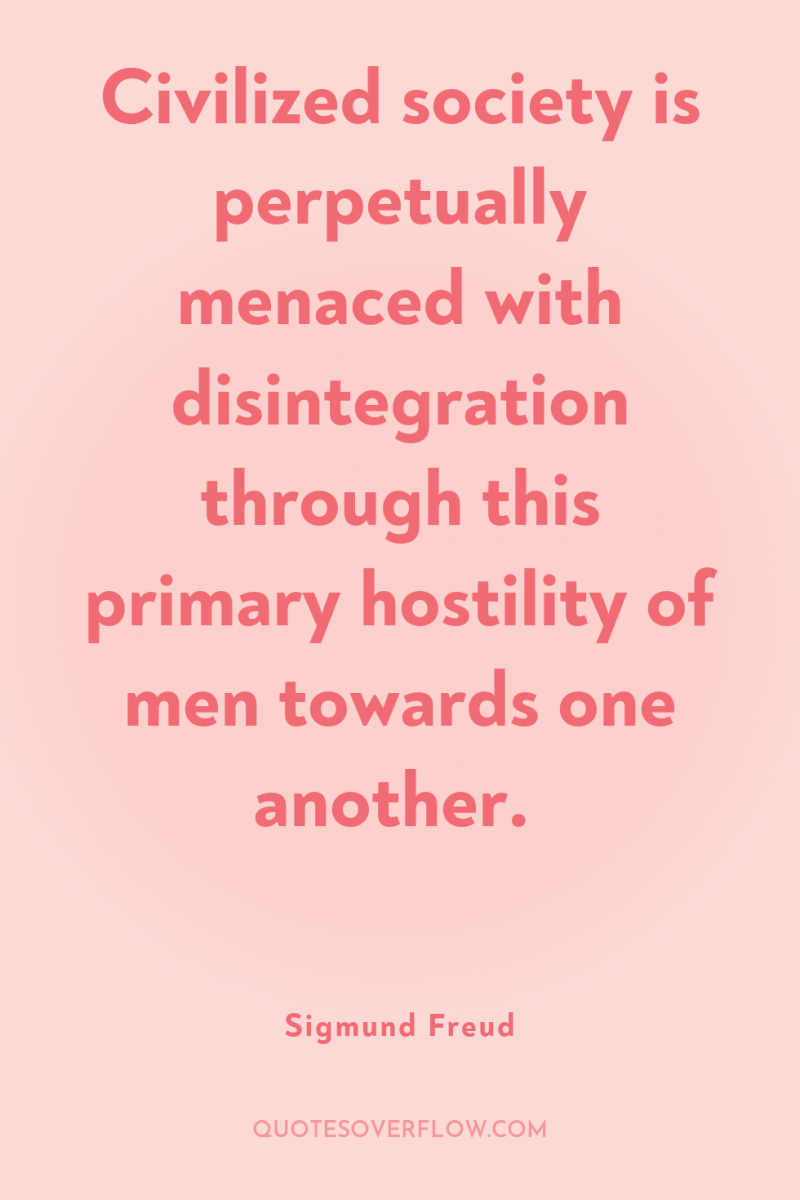
15
Civilized society is perpetually menaced with disintegration through this primary hostility of men towards one another.Sigmund Freud
16
Thus we arrive at the singular conclusion that of all the information passed by our cultural assets it is precisely the elements which might be of the greatest importance to us and which have the task of solving the riddles of the universe and of reconciling us to the sufferings of life -- it is precisely those elements that are the least well authenticated of any.Sigmund Freud
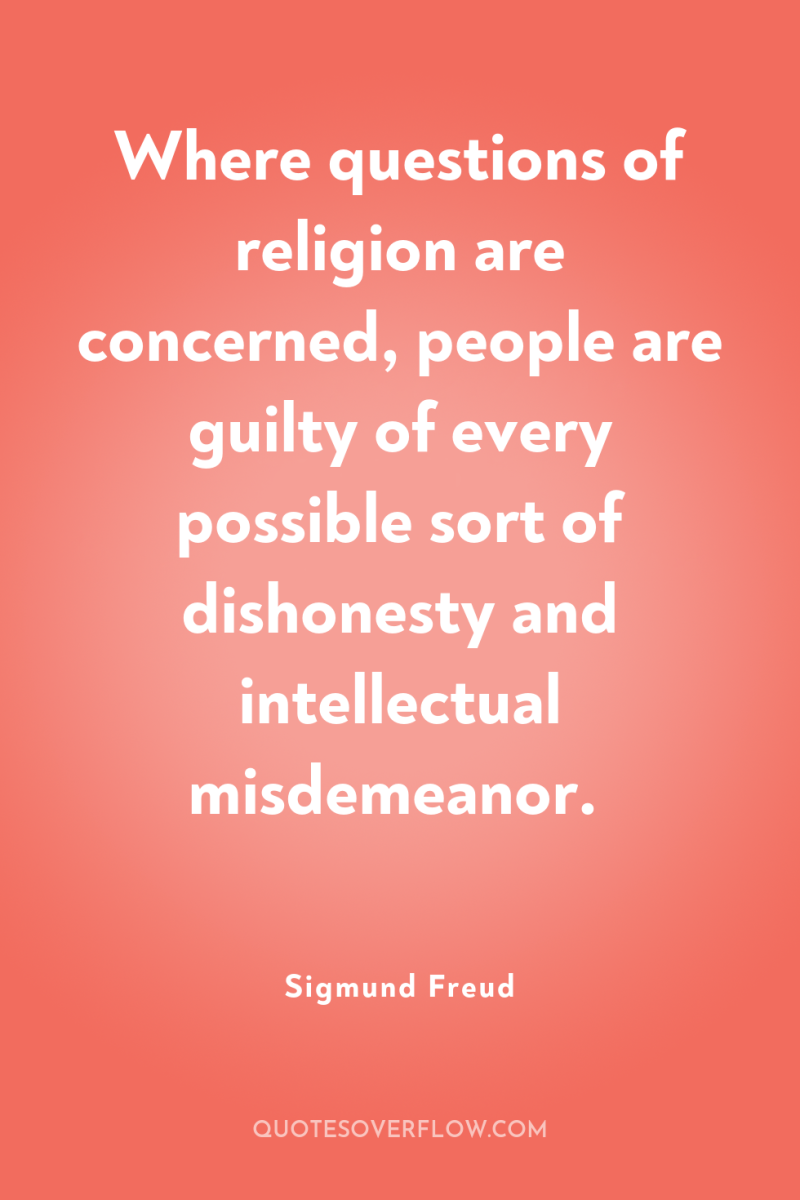
17
Where questions of religion are concerned, people are guilty of every possible sort of dishonesty and intellectual misdemeanor.Sigmund Freud
18
It would be very nice if there were a God who created the world and was a benevolent providence, and if there were a moral order in the universe and an after-life; but it is a very striking fact that all this is exactly as we are bound to wish it to be.Sigmund Freud
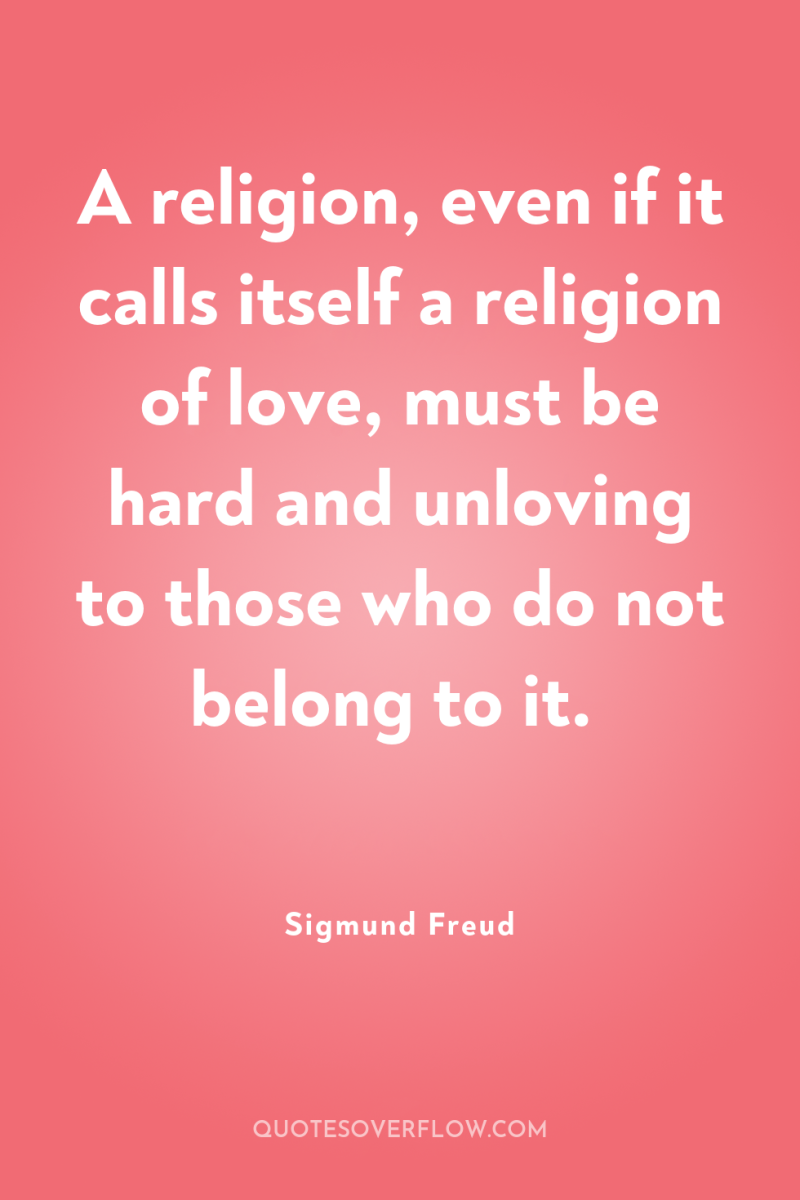
19
A religion, even if it calls itself a religion of love, must be hard and unloving to those who do not belong to it.Sigmund Freud
20
We believe that it is possible for scientific work to gain some knowledge about the reality of the world, by means of which we can increase out power and in accordance with which we can arrange our life. If this belief is an illusion, then we are in the same position as you. But science has given us evidence by its numerous and important successes that it is no illusion.Sigmund Freud
21
Perhaps the hopes I have confessed to are of an illusory nature, too. But I hold fast to one distinction. Apart from the fact that no penalty is imposed for not sharing them, my illusions are not, like religious ones, incapable of correction.Sigmund Freud
22
It would be an undoubted advantage if we were to leave God out altogether and honestly admit the purely human origin of all the regulations and precepts of civilization. Along with their pretended sanctity, these commandments and laws would lose their rigidity and unchangeableness as well. People could understand that they are made, not so much to rule them as, on the contrary, to serve their interests; and they would adopt a more friendly attitude to them, and instead of aiming at their abolition, would aim only at their improvement.Sigmund Freud
23
I can imagine that the oceanic feeling could become connected with religion later on. That feeling of oneness with the universe which is its ideational content sounds very like a first attempt at the consolations of religion, like another way taken by the ego of denying the dangers it sees threatening it in the external world.Sigmund Freud
24
Observe the difference between your attitude to illusions and mine. You have to defend the religious illusion with all your might. If it becomes discredited - and indeed the threat to it is great enough - then your world collapses. There is nothing left for you but to despair of everything, of civilization and the future of mankind. From that bondage I am, we are, free. Since we are prepared to renounce a good part of our infantile wishes, we can bear it if a few of our expectations turn out to be illusions.Sigmund Freud

25
The demons of animism were usually hostile to man, but it seems as though man had more confidence in himself in those days than later on.Sigmund Freud
26
.It is asking a great deal of a man, who has learnt to regulate his everyday affairs in accordance with the rules of experience and with due regard to reality, that he should entrust precisely what affects him most nearly to the care of an authority which claims as its prerogative freedom from all the rules of rational thought.Sigmund Freud
27
It is impossible to escape the impression that people commonly use false standards of measurement – that they seek power, success and wealth for themselves and admire them in others, and that they underestimate what is of true value in life.Sigmund Freud
28
We are threatened with suffering from three directions: from our body, which is doomed to decay..., from the external world which may rage against us with overwhelming and merciless force of destruction, and finally from our relations with other men... This last source is perhaps more painful to use than any other. (p77)Sigmund Freud
29
Religion is an attempt to get control over the sensory world, in which we are placed, by means of the wish-world, which we have developed inside us as a result of biological and psychological necessities. But it cannot achieve its end. Its doctrines carry with them the stamp of the times in which they originated, the ignorant childhood days of the human race. Its consolations deserve no trust. Experience teaches us that the world is not a nursery. The ethical commands, to which religion seeks to lend its weight, require some other foundations instead, for human society cannot do without them, and it is dangerous to link up obedience to them with religious belief. If one attempts to assign to religion its place in man’s evolution, it seems not so much to be a lasting acquisition, as a parallel to the neurosis which the civilized individual must pass through on his way from childhood to maturity. .Sigmund Freud
30
It sounds like a fairy-tale, but not only that; this story of what man by his science and practical inventions has achieved on this earth, where he first appeared as a weakly member of the animal kingdom, and on which each individual of his species must ever again appear as a helpless infant.. is a direct fulfilment of all, or of most, of the dearest wishes in his fairy-tales. All these possessions he has acquired through culture. Long ago he formed an ideal conception of omnipotence and omniscience which he embodied in his gods. Whatever seemed unattainable to his desires - or forbidden to him - he attributed to these gods. One may say, therefore, that these gods were the ideals of his culture. Now he has himself approached very near to realizing this ideal, he has nearly become a god himself. But only, it is true, in the way that ideals are usually realized in the general experience of humanity. Not completely; in some respects not at all, in others only by halves. Man has become a god by means of artificial limbs, so to speak, quite magnificent when equipped with all his accessory organs; but they do not grow on him and they still give him trouble at times.. Future ages will produce further great advances in this realm of culture, probably inconceivable now, and will increase man's likeness to a god still more.Sigmund Freud
31
The view is often defended that sciences should be built up on clear and sharply defined basal concepts. In actual fact no science, not even the most exact, begins with such definitions. The true beginning of scientific activity consists rather in describing phenomena and then in proceeding to group, classify and correlate them.Sigmund Freud
32
In his fight against the powers of the surrounding world his first weapon was magic, the first forerunner of our modern technology. We suppose that this confidence in magic is derived from the over-estimation of the individual’s own intellectual operations, from the belief in the ‘omnipotence of thoughts’, which, incidentally, we come across again in our obsessional neurotics.Sigmund Freud

33
Most people do not really want freedom, because freedom involves responsibility, and most people are frightened of responsibility.Sigmund Freud
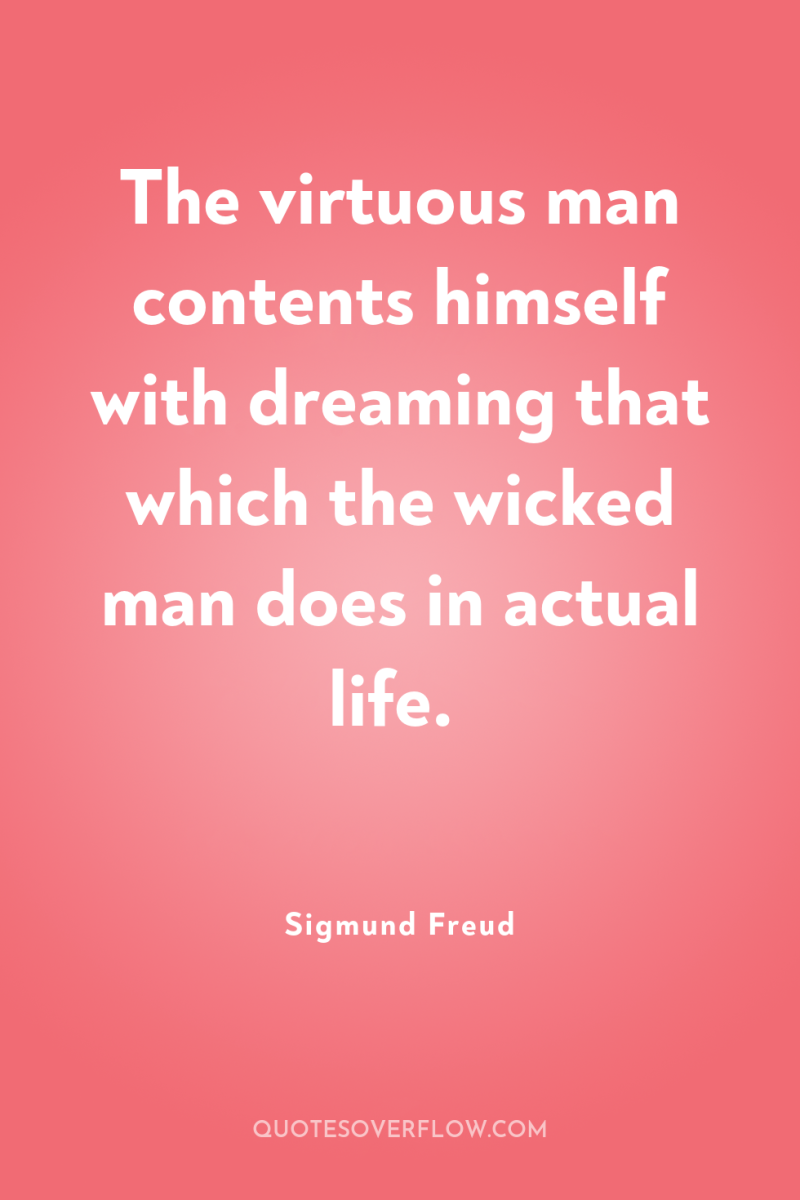
34
The virtuous man contents himself with dreaming that which the wicked man does in actual life.Sigmund Freud
35
Properly speaking, the unconscious is the real psychic; its inner nature is just as unknown to us as the reality of the external world, and it is just as imperfectly reported to us through the data of consciousness as is the external world through the indications of our sensory organs.Sigmund Freud
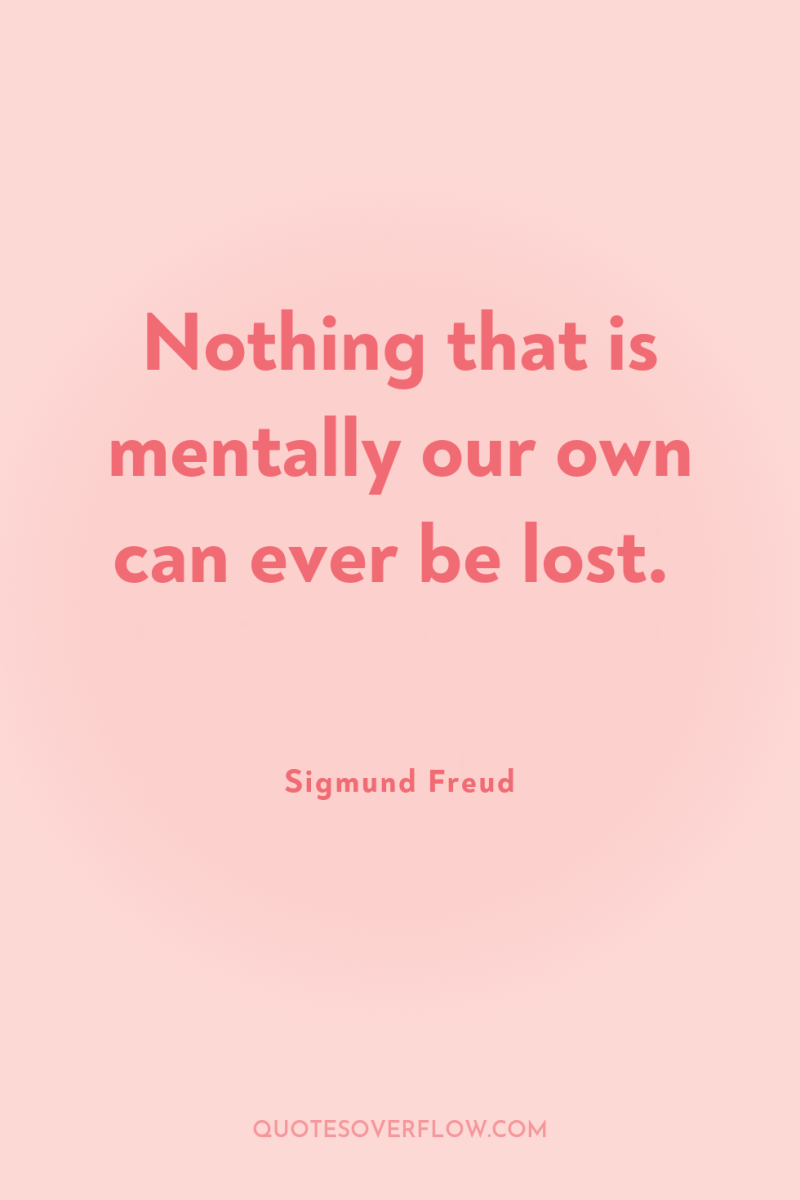
36
Nothing that is mentally our own can ever be lost.Sigmund Freud
37
In the depths of my heart I can’t help being convinced that my dear fellow-men, with a few exceptions, are worthless.Sigmund Freud
38
The voice of the intellect is soft one, but it does not rest until it has gained a hearing. Ultimately, after endless rebuffs, it succeeds. This is one of the few points in which one may be optimistic about the future of mankind.Sigmund Freud
39
As regards intellectual work it remains a fact, indeed, that great decisions in the realm of thought and momentous discoveries and solutions of problems are only possible to an individual, working in solitude.Sigmund Freud
40
The story is told of a famous German chemist that his marriage did not take place, because he forgot the hour of his wedding and went to the laboratory instead of to the church. He was wise enough to be satisfied with a single attempt and died at a great age unmarriedSigmund Freud
41
Experience teaches us that the world is not a nursery.Sigmund Freud
42
Couldn't I for once have you and the work at the same time?Sigmund Freud
43
I no longer believe that William Shakespeare the actor from Stratford was the author of the works that have been ascribed to him.Sigmund Freud
44
The woman who refuses to see her sexual organs as mere wood chips, designed to make the man's life more comfortable, is in danger of becoming a lesbian--an active, phallic woman, an intellectual virago with a fire of her own .. The lesbian body is a particularly pernicious and depraved version of the female body in general; it is susceptible to auto-eroticism, clitoral pleasure and self-actualization.Sigmund Freud
45
Where does a thought go when it's forgotten?Sigmund Freud
46
It is a predisposition of human nature to consider an unpleasant idea untrue, and then it is easy to find arguments against it.Sigmund Freud
47
When one does not have what one wants, one must want what one has.Sigmund Freud
48
In this way the ego detaches itself from the external world. It is more correct to say: Originally the ego includes everything, later it detaches from itself the external world. The ego-feeling we are aware of now is thus only a shrunken vestige of a far more extensive feeling - a feeling which embraced the universe and expressed an inseparable connection of the ego with the external world.Sigmund Freud
49
If we turn to those restrictions that only apply to certain classes of society, we encounter a state of things which is glaringly obvious and has always been recognized. It is to be expected that the neglected classes will grudge the favoured ones their privileges and that they will do everything in their to power to rid themselves of their own surplus of privation. Where this is not possible a lasting measure of discontent will obtain within this culture, and this may lead to dangerous outbreaks. But if a culture has not got beyond the stage in which the satisfaction of one group of its members necessarily involves the suppression of another, perhaps the majority---and this is the case in all modern cultures, ---it is intelligible that these suppressed classes should develop an intense hostility to the culture; a culture, whose existence they make possible by their labour, but in whose resources they have too small a share. In such conditions one must not expect to find an internalization of the cultural prohibitions among the suppressed classes; indeed they are not even prepared to acknowledge these prohibitions, intent, as they are, on the destruction of the culture itself and perhaps even of the assumptions on which it rests. These classes are so manifestly hostile to culture that on that account the more latent hostility of the better provided social strata has been overlooked. It need not be said that a culture which leaves unsatisfied and drives to rebelliousness so large a number of its members neither has a prospect of continued existence, nor deserves it. .Sigmund Freud
50
Every man is a poet at heart.Sigmund Freud
51
There is only one state- admittedly an unusual state, but not one that can be stigmatized as pathological- in which it does not do this. At the height of being in love the boundary between ego and object threatens to melt away. Against all the evidence of his senses, a man who is in love declares that 'I' and 'you' are one, and is prepared to behave as if it were a fact.Sigmund Freud
52
It is that we are never so defenceless against suffering as when we love, never so helplessly unhappy as when we have lost our loved object or its love.Sigmund Freud
53
We are so made that we can derive intense enjoyment only from a contrast and very little from a state of things.Sigmund Freud
54
This time once again it has been my chief aim to make no sacrifice to an appearance of being simple, complete or rounded off, not to disguise problems and not to deny the existence of gaps and uncertainties. In no other scientific field would it be necessary to boast of such modest intentions. They are universally regarded as self-evident; the public expects nothing else. No reader of an account of astronomy will feel disappointed and contemptuous of the science if he is shown the frontiers at which our knowledge of the universe melts into haziness. Only in psychology is it otherwise. There mankind's constitutional unfitness for scientific research comes fully into the open. What people seem to demand of psychology is not progress in knowledge, but satisfactions of some other sort; every unsolved problem, every admitted uncertainty is made into a reproach against it. Whoever cares for the science of mental life must accept these injustices along with it.Sigmund Freud
55
He who knows how to wait need make no concessions.Sigmund Freud
56
Religion is an illusion and it derives its strength from the fact that it falls in with our instinctual desires.Sigmund Freud
57
Dark, unfeeling and unloving powers determine human destiny.Sigmund Freud
58
He does not believe that does not live according to his belief.Sigmund Freud
59
With words one man can make another blessed, or drive him to despair; by words the teacher transfers his knowledge to the pupil; by words the speaker sweeps his audience with him and determines its judgments and decisions. Words call forth effects and are the universal means of influencing human beings.Sigmund Freud
60
The words which we use in our everyday speech are nothing other than watered-down magic.Sigmund Freud
61
Words and magic were in the beginning one and the same thing, and even today words retain much of their magical power.Sigmund Freud
62
The child is brought up to know its social duties by means of a system of love-rewards and punishments, and in this way it is taught that its security in life depends on its parents (and, subsequently, other people) loving it and being able to believe in its love for them.Sigmund Freud
63
Where does a thought go when it’s forgotten?Sigmund Freud
64
Our memory has no guarantees at all, and yet we bow more often than is objectively justified to the compulsion to believe what it says.Sigmund Freud
65
Smoking is indispensable if one has nothing to kissSigmund Freud
66
Public self is a conditioned construct of the inner psychological self.Sigmund Freud
67
Every man must find out for himself in what particular fashion he can be saved.Sigmund Freud
68
Our possibilities of happiness are already restricted by our constitution. Unhappiness is much less difficult to experience. We are threatened with suffering from three directions: from our own body, which is doomed to decay and dissolution and which cannot even do without pain and anxiety as warning signals; from the external world, which may rage against us with overwhelming and merciless forces of destruction; and finally from our relations to other men. The suffering which comes from this last source is perhaps more painful to us than any other. .Sigmund Freud
69
I have, as it were, constructed a lay-figure for the purposes of a demonstration which I desired to be as rapid and as impressive as possible.Sigmund Freud
70
No neurotic harbors thoughts of suicide which are not murderous impulses against others redirected upon himself.Sigmund Freud
71
Where such men love they have no desire and where they desire they cannot loveSigmund Freud
72
Men are not gentle creatures who want to be loved, and who at the most can defend themselves if they are attacked; they are, on the contrary, creatures among whose instinctual endowments is to be reckoned a powerful share of aggressiveness. As a result, their neighbor is for them not only a potential helper or sexual object, but also someone who tempts them to satisfy their aggressiveness on him, to exploit his capacity for work without compensation, to use him sexually without his consent, to seize his possessions, to humiliate him, to cause him pain, to torture and to kill him. Homo homini lupus [man is wolf to man]. Who, in the face of all his experience of life and of history, will have the courage to dispute this assertion?.Sigmund Freud
73
Men are not gentle creatures who want to be loved, and who at the most can defend themselves if they are attacked; they are, on the contrary, creatures among whose instinctual endowments is to be reckoned a powerful share of aggressiveness. As a result, their neighbor is for them not only a potential helper or sexual object, but also someone who tempts them to satisfy their aggressiveness on him, to exploit his capacity for work without compensation, to use him sexually without his consent, to seize his possessions, to humiliate him, to cause him pain, to torture and to kill him. Homo homini lupus [Man is a wolf to man]. Who, in the face of all his experience of life and of history, will have the courage to dispute this assertion?.Sigmund Freud
74
Men are not gentle creatures who want to be loved, and who at the most can defend themselves if they are attacked; they are, on the contrary, creatures among whose instinctual endowments is to be reckoned a powerful share of aggressiveness. As a result, their neighbor is for them not only a potential helper or sexual object, but also someone who tempts them to satisfy their aggressiveness on him, to exploit his capacity for work without compensation, to use him sexually without his consent, to seize his possessions, to humiliate him, to cause him pain, to torture and to kill him. Homo homini lupus [man is wolf to man]. Who in the face of all his experience of life and of history, will have the courage to dispute this assertion?.Sigmund Freud
75
Immorality, no less than morality, has at all times found support in religion.Sigmund Freud
76
Men are more moral than they think and far more immoral than they can imagine.Sigmund Freud
77
Where the questions of religion are concerned people are guilty of every possible kind of insincerity and intellectual misdemeanor.Sigmund Freud
78
We are never so defenseless against suffering as when we love.Sigmund Freud
79
I have found little that is 'good' about human beings on the whole. In my experience most of them are trash, no matter whether they publicly subscribe to this or that ethical doctrine or to none at all.Sigmund Freud
80
If you want to expel religion from our European civilization, you can only do it by means of another system of doctrines; and such a system would from the outset take over all the psychological characteristics of religion–the same sanctity, rigidity and intolerance, the same prohibition of thought–for its own defence. You have to have something of the kind in order to meet the requirements of education. And you cannot do without education.Sigmund Freud
81
Religion has clearly performed great services for human civilization. It has contributed much towards the taming of the asocial instincts. But not enough. It has ruled human society for many thousands of years and has had time to show what it can achieve. If it had succeeded in making the majority of mankind happy, in comforting them, in reconciling them to life and in making them into vehicles of civilization, no one would dream of attempting to alter the existing conditions. But what do we see instead? We see that an appallingly large number of people are dissatisfied with civilization and unhappy in it, and feel it as a yoke which must be shaken off; and that these people either do everything in their power to change that civilization, or else go so far in their hostility to it that they will have nothing to do with civilization or with a restriction of instinct. At this point it will be objected against us that this state of affairs is due to the very fact that religion has lost a part of its influence over human masses precisely because of the deplorable effect of the advances of science. We will note this admission and the reason given for it, and we shall make use of it later for our own purposes; but the objection itself has no force. It is doubtful whether men were in general happier at a time when religious doctrines held unrestricted sway; more moral they certainly were not. They have always known how to externalize the precepts of religion and thus to nullify their intentions. The priests, whose duty it was to ensure obedience to religion, met them half-way in this. God's kindness must lay a restraining hand on His justice. One sinned, and then one made a sacrifice or did penance and then one was free to sin once more. Russian introspectiveness has reached the pitch of concluding that sin is indispensable for the enjoyment of all the blessings of divine grace, so that, at bottom, sin is pleasing to God. It is no secret that the priests could only keep the masses submissive to religion by making such large concessions as these to the instinctual nature of man. Thus it was agreed: God alone is strong and good, man is weak and sinful. In every age immorality has found no less support in religion than morality has. If the achievements of religion in respect to man’s happiness, susceptibility to culture and moral control are no better than this, the question cannot but arise whether we are not overrating its necessity for mankind, and whether we do wisely in basing our cultural demands upon it.Sigmund Freud
82
In many criminals, especially youthful ones, it is possible to detect a very powerful sense of guilt which existed before the crime, and is therefore not its result but its motive. It is as if it was a relief to be able to fasten this unconscious sense of guilt on to something real and immediate.Sigmund Freud
83
At this point it may be objected: well, then, if even the crabbed sceptics admit that the statements of religion cannot be confuted by reason, why should not I believe in them, since they have so much on their side:Â tradition, the concurrence of mankind, and all the consolation they yield? Yes, why not? Just as no one can be forced into belief, so no one can be forced into unbelief. But do not deceive yourself into thinking that with such arguments you are following the path of correct reasoning. If ever there was a case of facile argument, this is one. Ignorance is ignorance; no right to believe anything is derived from it. .Sigmund Freud
84
That which he projects ahead of him as his ideal, is merely his substitute for the lost narcissism of his childhood - the time when he was his own ideal.Sigmund Freud
85
The liberty of the individual is no gift of civilization. It was greatest before there was any civilization.Sigmund Freud
86
America is the most grandiose experiment the world has seen, but, I am afraid, it is not going to be a success.Sigmund Freud
87
I am going to the USA to catch sight of a wild porcupine and to give some lectures.Sigmund Freud
88
...we cannot fail to recognise the influence which the progressive control over natural forces exerts on the social relationships between men, since men always place their newly won powers at the service of their aggressiveness, and use them against one another.Sigmund Freud
89
Conscience is the internal perception of the rejection of a particular wish operating in us.Sigmund Freud
90
Instinct of love toward an object demands a mastery to obtain it, and if a person feels they can't control the object or feel threatened by it, they act negatively toward it.Sigmund Freud
91
You wanted to kill your father in order to be your father yourself. Now you are your father, but a dead father.Sigmund Freud
92
A man's heterosexuality will not put up with any homosexuality, and vice versa.Sigmund Freud
93
We live in very remarkable times. We find with astonishment that progress has concluded an alliance with barbarism.Sigmund Freud
94
Unexpressed emotions will never die. They are buried alive and will come forth later in uglier ways.Sigmund Freud
95
I may now add that civilization is a process in the service of Eros, whose purpose is to combine single human individuals, and after that families, then races, peoples and nations, into one great unity, the unity of mankind.Sigmund Freud
96
I am actually not at all a man of science, not an observer, not an experimenter, not a thinker. I am by temperament nothing but a conquistador – an adventurer, if you want it translated – with all the curiosity, daring, and tenacity characteristic of a man of this sort.Sigmund Freud
97
We are so constituted that we can gain intense pleasure only from the contrast, and only very little from the condition itself.Sigmund Freud
98
I had thought about cocaine in a kind of day-dream.Sigmund Freud
99
I was making frequent use of cocaine at that time ... I had been the first to recommend the use of cocaine, in 1885, and this recommendation had brought serious reproaches down on me.Sigmund Freud
100
…much will be gained if we succeed in transforming your hysterical misery into common unhappiness. With a mental life that has been restored to health, you will be better armed against that unhappiness.Sigmund Freud